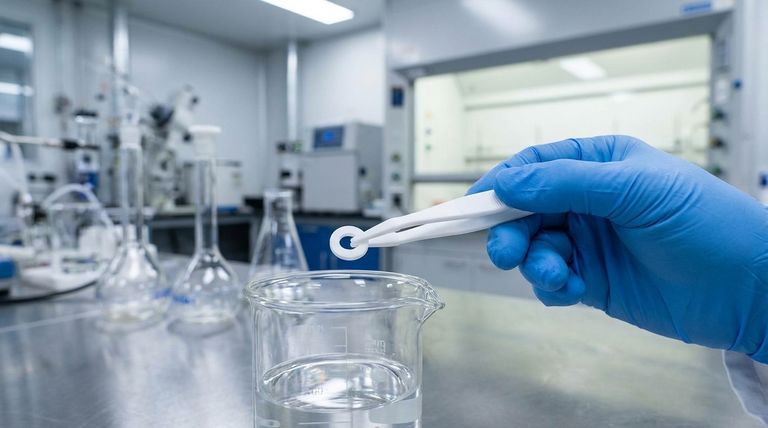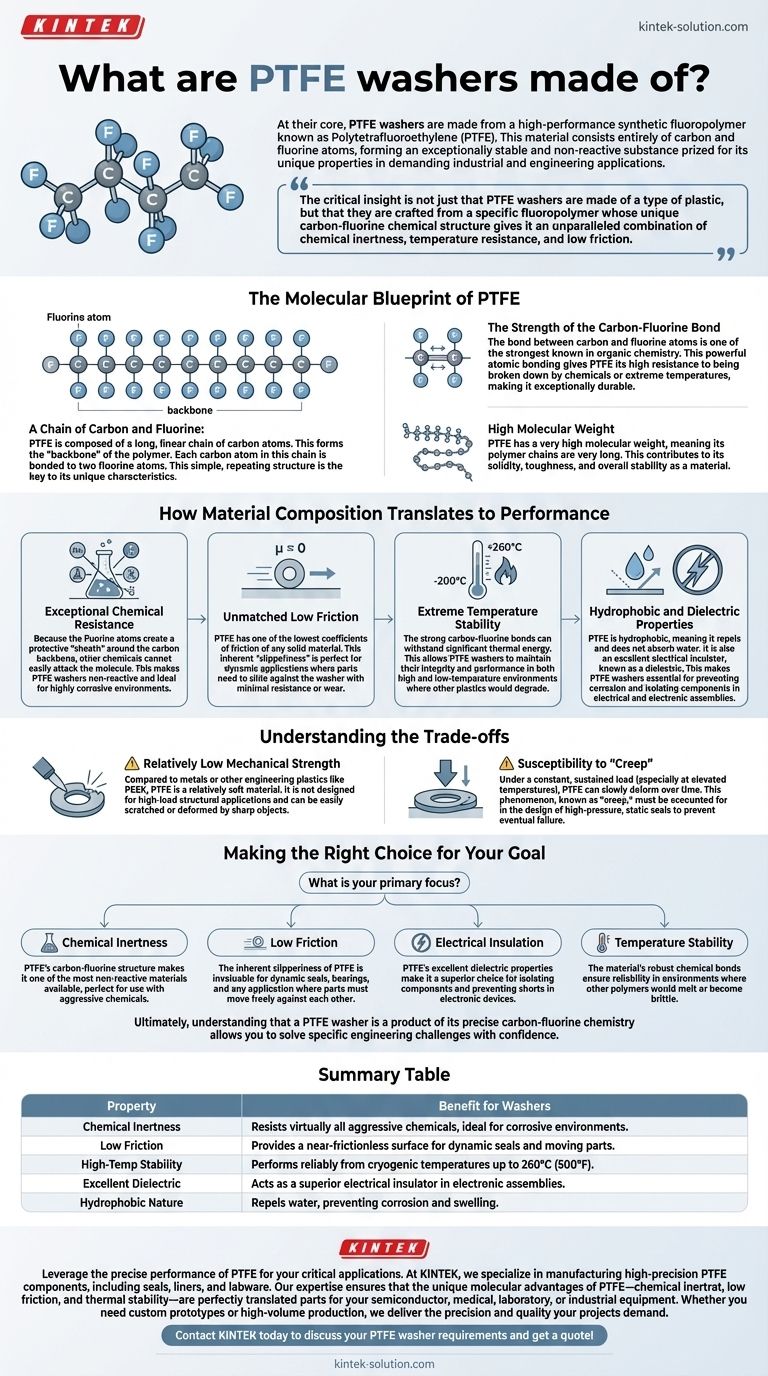At their core, PTFE washers are made from a high-performance synthetic fluoropolymer known as Polytetrafluoroethylene (PTFE). This material consists entirely of carbon and fluorine atoms, forming an exceptionally stable and non-reactive substance prized for its unique properties in demanding industrial and engineering applications.
The critical insight is not just that PTFE washers are made of a type of plastic, but that they are crafted from a specific fluoropolymer whose unique carbon-fluorine chemical structure gives it an unparalleled combination of chemical inertness, temperature resistance, and low friction.

The Molecular Blueprint of PTFE
To understand why PTFE is chosen for washers, we must first look at its fundamental chemical makeup. The material's performance is a direct result of its simple but incredibly robust molecular structure.
A Chain of Carbon and Fluorine
PTFE is composed of a long, linear chain of carbon atoms. This forms the "backbone" of the polymer.
Each carbon atom in this chain is bonded to two fluorine atoms. This simple, repeating structure is the key to its unique characteristics.
The Strength of the Carbon-Fluorine Bond
The bond between carbon and fluorine atoms is one of the strongest known in organic chemistry.
This powerful atomic bonding gives PTFE its high resistance to being broken down by chemicals or extreme temperatures, making it exceptionally durable.
High Molecular Weight
PTFE has a very high molecular weight, meaning its polymer chains are very long. This contributes to its solidity, toughness, and overall stability as a material.
How Material Composition Translates to Performance
The molecular structure of PTFE directly creates the properties that make it so valuable for sealing and isolating components. Each feature addresses a specific engineering challenge.
Exceptional Chemical Resistance
Because the fluorine atoms create a protective "sheath" around the carbon backbone, other chemicals cannot easily attack the molecule. This makes PTFE washers non-reactive and ideal for highly corrosive environments.
Unmatched Low Friction
PTFE has one of the lowest coefficients of friction of any solid material. This inherent "slipperiness" is perfect for dynamic applications where parts need to slide against the washer with minimal resistance or wear.
Extreme Temperature Stability
The strong carbon-fluorine bonds can withstand significant thermal energy. This allows PTFE washers to maintain their integrity and performance in both high and low-temperature environments where other plastics would degrade.
Hydrophobic and Dielectric Properties
PTFE is hydrophobic, meaning it repels and does not absorb water. It is also an excellent electrical insulator, known as a dielectric. This makes PTFE washers essential for preventing corrosion and isolating components in electrical and electronic assemblies.
Understanding the Trade-offs
While its properties are exceptional, no material is perfect for every application. Understanding the limitations of PTFE is critical for proper use.
Relatively Low Mechanical Strength
Compared to metals or other engineering plastics like PEEK, PTFE is a relatively soft material. It is not designed for high-load structural applications and can be easily scratched or deformed by sharp objects.
Susceptibility to "Creep"
Under a constant, sustained load (especially at elevated temperatures), PTFE can slowly deform over time. This phenomenon, known as "creep," must be accounted for in the design of high-pressure, static seals to prevent eventual failure.
Making the Right Choice for Your Goal
Selecting a PTFE washer is an intentional choice based on leveraging its distinct molecular advantages.
- If your primary focus is chemical inertness: PTFE's carbon-fluorine structure makes it one of the most non-reactive materials available, perfect for use with aggressive chemicals.
- If your primary focus is low friction: The inherent slipperiness of PTFE is invaluable for dynamic seals, bearings, and any application where parts must move freely against each other.
- If your primary focus is electrical insulation: PTFE's excellent dielectric properties make it a superior choice for isolating components and preventing shorts in electronic devices.
- If your primary focus is temperature stability: The material's robust chemical bonds ensure reliability in environments where other polymers would melt or become brittle.
Ultimately, understanding that a PTFE washer is a product of its precise carbon-fluorine chemistry allows you to solve specific engineering challenges with confidence.
Summary Table:
| Property | Benefit for Washers |
|---|---|
| Chemical Inertness | Resists virtually all aggressive chemicals, ideal for corrosive environments. |
| Low Friction | Provides a near-frictionless surface for dynamic seals and moving parts. |
| High-Temp Stability | Performs reliably from cryogenic temperatures up to 260°C (500°F). |
| Excellent Dielectric | Acts as a superior electrical insulator in electronic assemblies. |
| Hydrophobic Nature | Repels water, preventing corrosion and swelling. |
Leverage the precise performance of PTFE for your critical applications.
At KINTEK, we specialize in manufacturing high-precision PTFE components, including seals, liners, and labware. Our expertise ensures that the unique molecular advantages of PTFE—chemical inertness, low friction, and thermal stability—are perfectly translated into reliable parts for your semiconductor, medical, laboratory, or industrial equipment.
Whether you need custom prototypes or high-volume production, we deliver the precision and quality your projects demand.
Contact KINTEK today to discuss your PTFE washer requirements and get a quote!
Visual Guide

Related Products
- Custom PTFE Parts Manufacturer for Teflon Parts and PTFE Tweezers
- Custom PTFE Parts Manufacturer for Teflon Containers and Components
- Custom PTFE Square Trays for Industrial and Laboratory Use
- Custom PTFE Sleeves and Hollow Rods for Advanced Applications
- Custom PTFE Teflon Balls for Advanced Industrial Applications
People Also Ask
- What industries use PTFE machined parts and for what applications? Critical Components for Demanding Environments
- What are the best practices for achieving tight tolerances in Teflon (PTFE) machining? Master Precision for Demanding Applications
- What are the main advantages of using PTFE parts in industrial applications? Unlock Unmatched Chemical Resistance and Reliability
- What are the key considerations when machining Teflon? Master Precision Machining for Soft Polymers
- What are the future considerations for machining Teflon? Mastering Material Challenges with Smart Tech



















